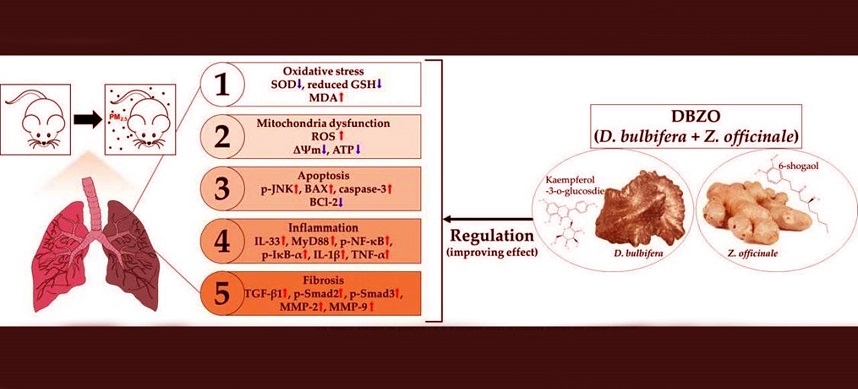Korean Scientists Discover a Combined Herbal Extract That Protects the Lungs from Airborne Pollutants Such as PM2.5
Nikhil Prasad Fact checked by:Thailand Medical News Team Dec 23, 2024 3 months, 4 weeks, 12 hours, 50 minutes ago
Medical News: In the modern era of urbanization and industrial growth, air pollution poses an escalating threat to public health. Among the various pollutants, fine particulate matter (PM2.5) has gained notoriety for its ability to penetrate deep into the lungs, triggering respiratory issues like chronic obstructive pulmonary disease, asthma, and pulmonary fibrosis. However, recent research sheds light on a promising natural remedy - a combined extract of Dioscorea bulbifera and Zingiber officinale (DBZO) - that could mitigate these harmful effects.
 Graphical Abstract - Korean Scientists Discover a Combined Herbal Extract That Protects the Lungs from Airborne Pollutants Such as PM2.5
Graphical Abstract - Korean Scientists Discover a Combined Herbal Extract That Protects the Lungs from Airborne Pollutants Such as PM2.5
This
Medical News report explores a study conducted by researchers from Gyeongsang National University and the Gyeongnam Anti-Aging Research Institute in the Republic of Korea, which demonstrates the protective potential of DBZO against PM2.5-induced respiratory damage.
Understanding PM2.5 and its Dangers
PM2.5 refers to airborne particles with a diameter of less than 2.5 micrometers. Due to their tiny size, these particles can carry toxic substances like heavy metals and polycyclic aromatic hydrocarbons into the respiratory system, causing oxidative stress and inflammation. Prolonged exposure to PM2.5 disrupts the balance of antioxidants in the lungs, damages cellular structures, and initiates chronic inflammation leading to fibrosis. The escalating health burden caused by PM2.5 has spurred scientists worldwide to seek effective remedies.
The Promise of Natural Remedies
Natural products have been used for centuries in traditional medicine to combat various ailments. Dioscorea bulbifera, commonly known as air potato, is renowned for its anti-inflammatory properties. Similarly, Zingiber officinale, or ginger, is celebrated for its antioxidant and respiratory protective qualities. Recognizing the complementary properties of these two plants, researchers combined their extracts in a 9:1 ratio to create DBZO, aiming to enhance its therapeutic potential.
Key Findings of the Study
The study was a comprehensive investigation into the effects of DBZO on PM2.5-induced respiratory damage using BALB/c mice as models. The findings revealed several critical benefits of DBZO:
-Reduction in Oxidative Stress: PM2.5 exposure significantly increased oxidative stress markers, such as malondialdehyde (MDA), in lung tissues. DBZO administration notably reduced MDA levels and restored the antioxidant balance by increasing glutathione (GSH) and superoxide dismutase (SOD) levels.
-Improvement in Mitochondrial Function: PM2.5 disrupted mitochondrial function, causing excessive production of reactive oxygen species (ROS), loss of membrane potential, and reduced ATP synthesis. DBZO demonstrated a dose-dependent protective effect by normalizing these parameters.
-
Immune System Modulation: Exposure to PM2.5 elevated white blood cell counts, including neutrophils and eosinophils, indicative of inflammation. DBZO effectively reduced these immune cell levels, mitigating systemic inflammation. Furthermore, it lowered serum immunoglobulin E (IgE) levels, which are associated with allergic reactions.
-Regulation of Inflammatory Pathways: The study revealed that PM2.5 activated inflammatory signaling pathways, including NF-κB and TGF-β/Smad. DBZO effectively downregulated these pathways, reducing the expression of pro-inflammatory cytokines like IL-1β and TNF-α.
-Preservation of Lung Architecture: Histopathological examination showed that PM2.5 exposure caused thickening of the alveolar septa and structural collapse in lung tissues. DBZO treatment preserved normal lung architecture, as evidenced by a significant reduction in alveolar damage.
-Apoptosis Prevention: PM2.5 exposure triggered cell death pathways in lung tissues by upregulating pro-apoptotic proteins such as BAX and caspase-3 while downregulating anti-apoptotic proteins like BCl-2. DBZO effectively balanced these markers, preventing unnecessary cell death.
How DBZO Works
The protective effects of DBZO stem from its rich bioactive compounds, including catechin, astragalin, 6-gingerol, 8-gingerol, and 6-shogaol. These compounds possess potent antioxidant and anti-inflammatory properties, working synergistically to neutralize ROS, inhibit inflammatory mediators, and promote cellular repair. Additionally, DBZO regulates immune responses, preventing excessive inflammation and fibrosis.
Conclusion
The study presents compelling evidence for the potential of DBZO as a natural remedy against PM2.5-induced respiratory damage. By restoring antioxidant defenses, improving mitochondrial function, and modulating inflammatory and apoptotic pathways, DBZO offers a holistic approach to protecting lung health. These findings highlight the importance of exploring traditional medicine to address modern health challenges.
As air pollution continues to threaten public health globally, interventions like DBZO could play a pivotal role in respiratory disease prevention and management. However, further clinical trials are essential to validate these results in humans and establish optimal dosages and safety profiles.
The study findings were published in the peer-reviewed journal: Antioxidants.
https://www.mdpi.com/2076-3921/13/12/1572
For the latest on Herbs and Phytochemicals, keep on logging to Thailand
Medical News.
Read Also:
https://www.thailandmedical.news/news/taiwanese-study-finds-that-pm2-5-particles-in-polluted-air-increases-risk-of-covid-19-infection
https://www.thailandmedical.news/news/air-pollution-found-to-trigger-higher-occurrences-of-head-and-neck-cancer
https://www.thailandmedical.news/news/thailand-medical-study-links-air-pollution-to-increased-liver-cancer-mortality
https://www.thailandmedical.news/news/thailand-medical-experts-warn-air-pollution-crisis-in-chiangmai-is-causing-alarming-rise-in-lung-fibrosis-lung-cancer-and-
https://www.thailandmedical.news/news/thailand-medical-study-finds-that-long-term-air-pollution-exposure-disrupts-kynurenine-pathway-elevating-disease-risks
https://www.thailandmedical.news/news/air-pollution-accelerates-worsening-of-bone-health-
https://www.thailandmedical.news/news/how-air-pollution-affects-eye-health
https://www.thailandmedical.news/news/study-by-university-college-london-shows-air-pollution-increases-glaucoma-risk
https://www.thailandmedical.news/news/new-research-shows-that-air-pollution-is-causing-lots-of-deaths-due-to-heart-and-cardiovascular-issues
